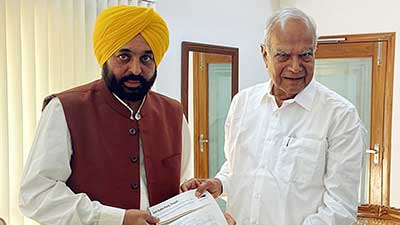Date: 03/03/2023
Relevance: GS-2: Parliament and State Legislatures—Structure, Functioning, Conduct of Business, Powers & Privileges and Issues Arising out of these.
Key Phrases: Governor’s Role in Summoning the House, Article 174 of the Constitution, Nabam Rebia (2016), Article 167, One-upmanship, role as the eyes and ears of the Union government, Sarkaria Commission and Punchhi Commission.
Why in News?
- The recent tussle between the Governor and Chief Minister of Punjab has brought to the forefront the issue of constitutional boundaries and the need for maturity in handling differences.
- The Supreme Court has advised both parties to display statesmanship and not let rancour prevail over propriety.
Governor’s Role in Summoning the House:
- The Governor has the power to summon the House from time to time “to meet at such time and place as he thinks fit” under Article 174 of the Constitution.
- The Constitution Bench had ruled in Nabam Rebia (2016) that the Governor can summon, prorogue and dissolve the House only on the aid and advice of the Council of Ministers.
- Despite this ruling, the Governor of Punjab’s position on convening the Budget session of the Punjab Assembly only after obtaining legal advice on the Chief Minister’s response to his queries was not in line with constitutional boundaries.
Chief Minister’s Duty to Furnish Information:
- Article 167 ensures that the Governor is kept informed about the decisions and proposals of the Council of Ministers and that the Chief Minister provides any information required by the Governor related to the administration of the state and proposals for legislation.
- The Chief Minister’s response to the Governor questioning the sending of some school principals to Singapore for training, that he was responsible only to the people of Punjab and not to a Governor appointed by the Centre, was therefore questionable and not in line with constitutional duties.
Instances of One-upmanship:
- Instances of one-upmanship between Governors and Chief Ministers are becoming more frequent in various states.
- Some Governors stretch their discretion to areas not specifically mentioned in the Constitution, and incumbents in Raj Bhavan tend to take their role as the eyes and ears of the Union government too literally, often getting into the political domain.
- This can lead to Governors playing the role of commentator, critic, and even opposition, which is not conducive to constitutional governance.
Issues:
- Constitutional crisis:
- When Governors and Chief Ministers engage in power struggles, it can lead to a constitutional crisis that could affect the smooth functioning of the government and cause a breakdown in governance.
- Political instability:
- If the Governor and Chief Minister are unable to resolve their differences, it could lead to political instability in the state, which could have a ripple effect on the nation as a whole.
- Loss of public trust:
- The public may lose trust in the government if the elected representatives are unable to work together and engage in petty squabbles, resulting in a lack of progress and development.
- Misuse of power:
- Governors risk overstepping their boundaries and misusing their discretionary powers if they take their role as the eyes and ears of the Union government too literally.
- Delayed decision-making:
- If the Governor and Chief Minister are at loggerheads, it could delay decision-making and cause delays in implementing policies and programs that are critical to the state's development.
Way forward:
- Respect constitutional boundaries:
- Both Governors and Chief Ministers must respect constitutional boundaries and understand the limits of their powers.
- They should work within the framework of the Constitution and follow established protocols and procedures.
- Foster constructive dialogue:
- The Governor and Chief Minister should engage in constructive dialogue to resolve any differences or disputes that may arise.
- They should work towards building a healthy working relationship that is based on mutual respect and trust.
- Review the appointment process:
- There is a need to review the appointment process of Governors to ensure that they are selected based on merit, and not merely as a reward for political loyalty.
- This will help ensure that individuals with the requisite skills and experience are appointed to this critical position.
- Professionalism and Mutual Respect:
- Encourage professionalism and mutual respect between Governors and Chief Ministers to foster a positive working relationship.
- Avoid personal attacks or making decisions based on political considerations.
- Implement the recommendations:
- There should be the implementation of the recommendations of the Sarkaria Commission and Punchhi Commission regarding the office of the governor.
Conclusion:
- It is imperative for all constitutional functionaries to uphold the principles of mature statesmanship and propriety while discharging their duties.
- Governors and Chief Ministers should respect the constitutional boundaries and work towards maintaining cordial relations for the smooth functioning of the democratic system.
- By avoiding one-upmanship and adhering to their prescribed roles, they can ensure the effective governance of their respective states.
- Ultimately, the success of constitutional democracy hinges on the responsible actions of all those entrusted with its functioning.
Source: The Hindu
Mains Question:
Q. Analyse the issues of the increasing instances of one-upmanship between Governors and Chief Ministers in various states, and suggest measures to ensure better adherence to constitutional boundaries and enhance constitutional governance in the country.






















